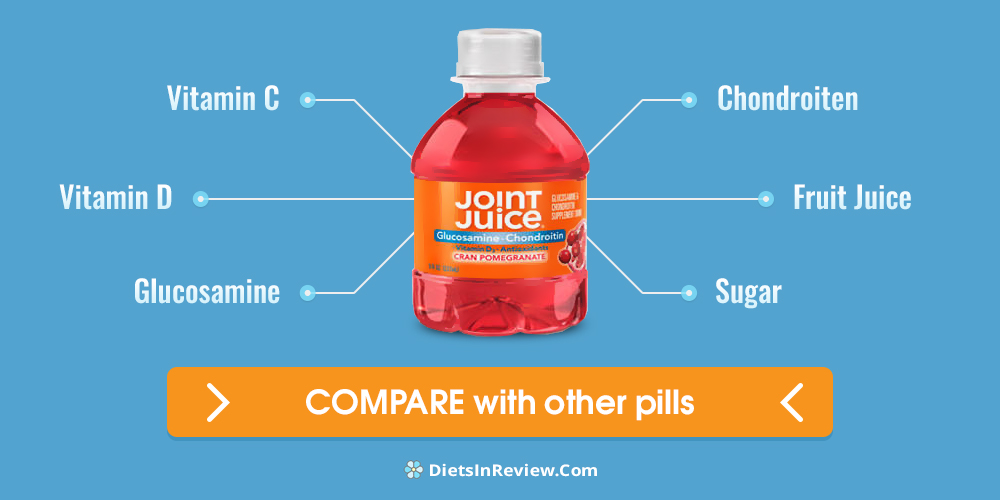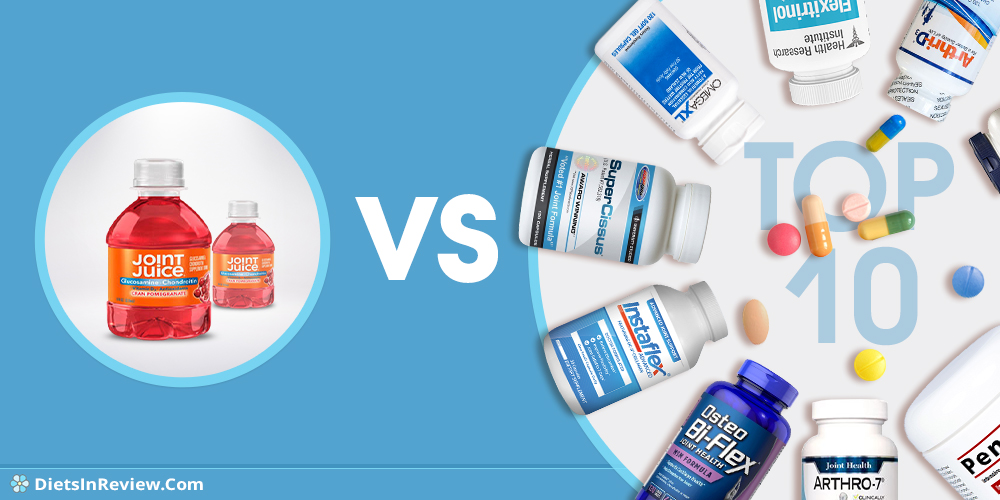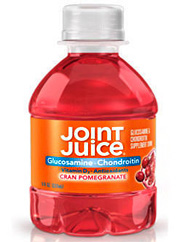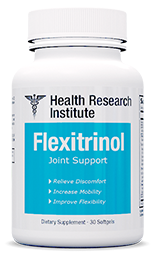Joint Juice Review: Don’t Buy Before You Read This!
User Rating:
92%
 +
-
+
-
What is it?
Joint Juice is a ready-to-drink joint health supplement that comes in liquid form in order for easier absorption. It’s available in both blueberry-acai and cranberry-pomegranate flavors, however it should be noted that those are mostly synthetic additives and that Joint Juice contains very little actual fruit juice. Joint Juice is an alternative to consumers that do not like pills or powdered supplements and are searching for a more flavorful alternative.
Our experts have determined that Flexitrinol is the best joint health supplement available on the market. It is a zero calorie, sugar- and sweetener-free supplement that has been proven to be safe and effective over a series of clinical trials. Click here to learn more about why Flexitrinol is so effective.
Joint Juice Ingredients and Side Effects

Ingredients:
| Vitamin C |
Vitamin D |
Glucosamine |
Chondroiten |
| Fruit Juice |
Sugar |
Sucralose |
Malic Acid |
Vitamin C: One of the most basic vitamins in the human body and especially fundamental to immune health. Vitamin C is a frequent additive to joint health supplements because of its key role in bone and cartilage health, however too much C can lead to overgrowth, bone spurs, and increased joint pain.
Vitamin D: Beneficial for a number of key biological functions including skin and joint health. Like vitamin C some is needed but too much can be problematic and doctors do not recommend more than 4000 IU of vitamin D a day. Side effects of chronic vitamin D overuse include:
- Gastro-Intestinal Issues: Nausea, vomiting and internal cramping are all possible.
- Energy Issues: Fatigue, weakness, and loss of appetite have been reported in some patients.
- Metallic taste: Some users report a strange taste or feeling in their mouths.
Glucosamine: One of the most popular joint health supplement additives in use today due to its beneficial effects on synovial fluid (joint lubricant) and cartilage. Glucosamine is often recommended for patients suffering from a number of conditions including:
- Depressed immune function
- Overall microbiome health
There are few side affects that have been associated with glucosamine, and the ones that have been reported are minor in nature.

Chondroiten: Another popular additive found in most leading joint health supplements. Chondroiten stimulates cartilage growth and has been shown to improve mobility and flexibility while decreasing joint pain. Side effects associated with chondroiten are experienced infrequently, however some users have reported mild allergic reactions.
Fruit Juice: Both flavors of Joint Juice contain less than 1% real fruit juice and natural flavoring agents.
Sugar: Used to sweeten the beverage, sugar has few positive effects when taken as part of a supplement blend. There are a number of health conditions that sugar intake can lead to including:
- Obesity
- Diabetes
- Tooth decay
- Acne
- Heart disease
Sucralose: An artificial sweetener that is often substituted for sugar in beverages that market themselves as “diet,” however it’s been shown to have many of the same consequences for the body as sugar including:
Malic Acid: An organic compound taken to combat fibromyalgia or sometimes tiredness. The medical benefits of malic acid are largely unsubstantiated, however there also seem to be relatively few side affects associated with its ingestion.
Our panel of nutritional experts have assessed the top quality joint health supplements available today. Click here for their complete list.
Joint Juice Quality of Ingredients
The Joint Juice ingredient list doesn’t inspire much hope for the effectiveness of their product.
Both vitamin C and vitamin D are great for the body in moderation but the problem with including them in daily supplements is that it is far to easy to take more than the recommended amount. Joint Juice sadly does not list how much of either vitamin is in their product, making it difficult if you’re getting too much or not enough C and D in your diet.
Joint Juice lists 1,500 mg of “glucosamine plus chondroiten” on their label, however that is a bit misleading. Glucosamine and chondroiten, while similar in their effects on the body, are two totally separate chemicals.
Glucosamine is derived from shellfish, whereas chondroiten usually comes from bovine or shark cartilage. There are some people that have sensitivities to one or the other, and either may be harder to come by or more in vogue at any given point in time. Not labeling the exact quantities of each is a red flag for consumers that their dosage amounts may be inconsistent or in unfavorable ratios.
Sugar and sucralose are not ingredients that belong in nutritional supplements. They are non-beneficial from a wellness perspective and can contribute to obesity and blood sugar issues.

Furthermore, Joint Juice does not list how much sucralose is in their product. Their drinks are undeniably sweet so it’s possible that they are using large amounts of sweetener to cover for the fact that they only have 2 g of sugar, not much for an 8 oz beverage (but tons for a supplement).
Click here to see our expert’s analysis of the best OTC joint health supplements.
The Price and Quality of Joint Juice
Joint Juice is sold in two flavors and comes in individual bottles, or in 6- 12- or 24-packs. Their pricing structure is as follows:
That price is about what one would expect to pay for your average sugary fruit-flavored drink at a convenience store, which is pretty close to what Joint Juice seems to amount to.
Click here to see a list of the best joint health supplements available today, assembled by our panel of qualified experts.
Business of Joint Juice
Joint Juice is a product of Premier Nutrition Corporation, which itself is a subsidiary of Post. They can be contacted at:
Phone Number: (888) 642-9941
Address: c/o MFALS
15820 Euclid Ave
Chino, CA 91708
They do not have an e-mail address or contact form available on their website.
They are also not listed with the Better Business Bureau, though there do not seem to be any pending lawsuits against Joint Juice at this time.
To see a list of the best joint health supplements available on the market today, click here.
Customer Opinions of Joint Juice
Online reviews of Joint Juice are mostly positive, however there are a number of complaints about the product as well. They include:
“Don’t know if this helps my joints or not, but it tastes gross.”
“To be honest, this stuff is just snake oil.”
“Took me a while to get used to the taste but now I’m ok with it. Still waiting to see results.”
The most frequent complaints had to do with the overly sweet taste, which was the reason many users didn’t choose to keep taking the product. Others complained of its effectiveness and its cost.
Our panel of nutritional experts have assembled a list of the best joint health supplements that can be seen here.
Conclusion – Does Joint Juice Work?
Overall it is difficult to assess the quality of Joint Juice. The ambiguity of their ingredients list mixed with all of the unnecessary sweeteners make it difficult for our panel of experts to recommend Joint Juice for anything beyond a recreational beverage.
The best joint health supplement from a nutritional perspective if Flexitrinol. It combines a full complement of top-quality ingredients into a filler-free pill that has no unnecessary fat, sugar, or carbohydrates. Click here to learn more about how Flexitrinol improves joint health and mobility.
Featured Diets













My friend don’t love it, my cousin likes it…
The joint juice is wonderful, I was told I may need a hip replacement, but after drinking this drink for a while, I have NO pain and am now jumping rope and running in place for exercise. I will NEVER stop drinking joint juice
I have used this for 3 weeks now. 1 8oz bottle a day. I can move my shoulders easier and lift my arms over my head without pain. Works for me. I dont drink soda and very little coffee. My urine is usually clear. I noticed a slight red tint to it now but no other side effects.